HIT CHANNEL EXCLUSIVE INTERVIEW: June 2020. We had the great honour to talk with a legendary drummer: Neal Smith. He is best known as the original drummer of the Alice Cooper Group, recording with them monumental albums such as “Love It To Death”, “Killer”, “School’s Out” and “Billion Dollars Babies”. He has also recorded with Billion Dollar Babies, Buck Dharma, Plasmatics, Bouchard Dunaway & Smith (BDS), Cinematik, Deadringer and Killsmith. He just released a solo album titled “POP 85/95” with pop songs written between 1985 and 1995. Read below the very interesting things he told us:
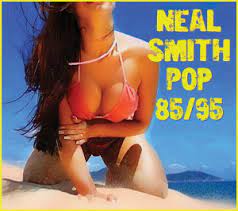 How did you come up with the idea to release the “POP 85/95” album with songs that you wrote a long time ago?
How did you come up with the idea to release the “POP 85/95” album with songs that you wrote a long time ago?
Well, the songs on “POP 85/95” were recorded and written a long time ago. I found them in my archives, in my studio in Connecticut and I found that they sounded pretty good and to save them for posterity, I started cleaning them up and I added bass guitar. Otherwise, all the music was already recorded and everything was there from the late ‘80s and the early ‘90s. It sounded better and better and a friend of mine, Peter Catucci, from the Killsmith project put bass guitar on it and they sounded pretty good. So, I decided to release it and I hope that the fans will enjoy something: A blast from the past.
How challenging was it for you to program the synthesized drum parts of “POP 85/95” album?
That’s a good question and thank you for asking. All through the ‘80s and ‘90s, as people who were around then and remember, in popular music there were a lot of synthesized drums in popular records and a lot of those synthesized drums would be programmed by engineers and keyboard players in different bands. I was a little disappointed that more drummers weren’t actually programming their drums. So, I had a synthesizer that I always was writing songs on and it also had the capability of drum sections and as I was writing the songs, I added the drum parts. Hopefully they would sound similar to what I would be actually playing live on a real set of drums. So, that was my inspiration.
I like Jay Jesse Johnson’s (“Triple J”) guitar on songs like “Love Sets the Night on Fire” and “Fly Home Sweet Angel”. What does his presence add to the music of “POP 85/95”?
Jay Jesse Johnson, “Triple J”, he’s a great rock guitarist and a great blues guitarist. He lives in the Midwest now, but he lived in New England for many years and we were friends. I had finished these songs, they were completely done with keyboards, drums and vocals and he came in and added the lead guitar. That was one of the big inspirations that I wanted to revive these songs and release them.
What are the latest news from your solo project Killsmith?
I am currently writing a new Killsmith album that I hopefully will release before the end of the year 2020. It is called “Killsmith Goes West” and it has a little bit more of a rock, western and country feel to it, that I have never done before. There are some new songs and songs that I’ve been hanging around for a long time and I decided to put an album together with that sort of feel and I’m pretty excited about that one, too.
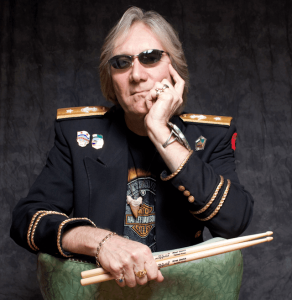 How revolutionary was it in 1968 to name a male band Alice Cooper?
How revolutionary was it in 1968 to name a male band Alice Cooper?
In the springtime of 1968, we were called The Nazz. We soon found out that there was another band with Todd Rundgren in Philadelphia, Pennsylvania in USA that had the same name, The Nazz and they just signed a record deal. So, the unwritten law of rock ‘n’ roll is somebody who has the name the same as yours and gets a record deal, you must change your name. We had a period of time to figure out a new name. It was in late February and March 1968. We were in Arizona a little earlier, before that, and Alice and I, we were playing on an Ouija board with a friend of ours, Dick Christian, who was almost like our manager, road manager at the time, he was also a friend of ours from college and from school. We were on an Ouija board and we were talking about past lives, what we might have done, what our names were. I played it first and it pulled a story about a past life and then Vincent, who became Alice, he was playing it with Dick Christian and he asked a name on a past life and it spelled out “Alice Cooper” on the Ouija board. I was there, that’s where the name originated and any other story it’s not true. So, it was just a name. It was just a funny game that we were playing and then, a month later when we had to come up with a name for the band, that one kept popping up, so eventually we all decided equally, everyone of us -between Glen (ed: Buxton -lead guitar), Dennis (ed: Dunaway -bass), Michael (ed: Bruce -rhythm guitar), myself and Vince at the time- that Alice Cooper would be the new name for our band.
What was it like to have Frank Zappa as your boss in Straight Records?
Frank Zappa was a very talented musician and a very good businessman. We had auditioned for almost every record company in Los Angeles in the year 1968 and the only person that really understood the band and liked the band a lot was Frank Zappa. That’s why he released our first two albums “Pretties for You” (1969) and “Easy Action” (1970). So, we were different enough to catch his attention, having liked us and signing us to Straight Records, his new record label. But he wanted to make some changes: He wanted to change our name to Alice Cookies, we were totally against it. He wanted us to use his manager, Herb Cohen, to manage our band, Alice Cooper, we were totally against that. He also had another idea for our first album: To put every song on a little tiny record and put it in a tuna fish can, a little bottle can, The Alice Cookies, and we were totally against that. So, there were some trying, challenging times for us and that’s why we found our managers, Shep Gordon and Joe Greenberg, Alive Enterprises, and that changed everything for us, at that time. They fought for us, which is exactly what we wanted and we got what we wanted, but Frank Zappa and the group Alice Cooper stayed friends during the whole time.
Were you surprised when “School’s Out” (1972) went to #2 on Billboard charts?
I am still surprised by the popularity of “School’s Out”, even now, in the new millennium, in 2020 and hopefully even more, as time goes on. I’m humbled by that. We were just trying to do a follow-up to the “Killer” album with the single “Under My Wheels”, which was a great single. A great album, the first album to go platinum. By now, we were having a big following, we were headlining every place we played, but in New York and Los Angeles in the United States where the big top40 radio stations were, were not playing our music. We were being played in the Midwest and all the coasts, the East Coast and the West Coast in the United States, they were playing our albums, but none of our records on AM radio. Finally, when “School’s Out” has been released, the summer of 1972, the song became so popular that they had to play it and that broke us into the commercial radio markets in New York City and in Los Angeles and all the big cities across United States. The “School’s Out” was very important to us. We never realized it that it was gonna become the anthem that it has become and that it would be played every year when school’s out for the next four or five decades. It’s unbelievable.
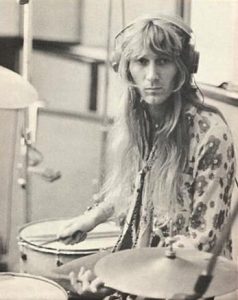 How spontaneous was your intro to “Billion Dollar Babies” song?
How spontaneous was your intro to “Billion Dollar Babies” song?
The song was already written and it was a pretty straight drum beat through the whole song. I was also impressed by Charlie Watts from the Rolling Stones and the beginning of the song “Get Off of My Cloud”, which has a great drum intro. As a rudimentary drummer and studying snare drum for two years before I ever even get a full set of drums -I started drums when I was a kid in elementary school and junior high school- I was very familiar with the rudiments and I loved flams. If you Google “flam on drums”, people could figure out what that is, so I created the beginning of “Billion Dollar Babies”, with that in mind; something original like “Get Off of My Cloud” by the Stones, even more complicated and a little more catchy. That’s where the idea came from and Bob Ezrin, our producer, who I love him as my brother, he wanted a more straight beat through the whole song and he said: “If you play it perfectly, then we will use it because I want the straight beat” and of course I played it perfectly. To this day, it’s on the record and it has become my signature song. Certainly, a signature: When the fans hear that intro, they know that the song “Billion Dollar Babies” is coming up.
Would you like to tell us a few words about the song “Unfinished Sweet”, that you co-wrote on “Billion Dollar Babies” (1973) album?
Sure, “Unfinished Sweet” was an idea of a song that I was writing at the time and Alice came up with some lyrics. Alice wrote pretty much the 100% of the songs’ lyrics in the band and he came up with the concept of the dentist. Going to the dentist and lying under sedation a gas and you have a dream that you are James Bond, because we were very big James Bond fans, all the movies, especially Sean Connery, the original James Bond. That’s where the story came from, the idea for the story, but of course on stage we had The Amazing Randi as the dentist with the giant drill and he was drilling in Alice’s teeth. Pretty much everybody when goes to the dentist, nobody wants to have the teeth drilled without novocaine or gas or something that eases the pain. So, it’s a universal fear that everybody has and that was a great theatrical piece on stage and it really worked well in the Billion Dollar Babies Tour in 1973.
Did you realize in the early ‘70s that your stage show with Alice Cooper was ahead of its time?
I think that we found our niche. When we first changed our name to Alice Cooper, we had to find out who Alice Cooper was. We all had majors in college together and we were very creative people. The ideas were coming from Dennis, from Glen, from Michael, from me, from Alice, all day long, every day. The electric chair was Dennis Dunaway’s idea, the electric chair on the song “Black Juju” from “Love It to Death” and then we continued to the gallows on the “Killer” album and “School’s Out” and then the guillotine on the Billion Dollar Babies Tour. So, once we found what we were doing, that was just our thing. Every band has to find out what their niche is, what they are good at, what has never been done before. Once, we went into the theatrical aspect, we added violence, but violence like in a movie. It’s for fun, it’s for the show, it’s theatrical. Once we had that, that was our thing. That was our niche.
So, nowadays is just a standard in Alice’s show, but back then when we were first doing it, it was a really groundbreaking thing. We were banned from a lot of cities, they hated us and the fans loved this and that’s because of how crazy we were on stage and we were giving them something that they had never seen before. I think a lot of our music is heard over the years and still sounds viable and stood the test of time. Maybe it was ahead of the time, I don’t know, but there was a lot of progressive music being recorded in the early ‘70s. Some of it, is still being played. Some of it, is not, but a lot of that, that is not being played now, it’s still great music. Again, we didn’t plan on anything, we were just trying to write our next album and when we had luck, it would be a hit album and of course “Billion Dollar Babies” went to #1 in all the record charts in United States and many of them in United Kingdom and Europe.
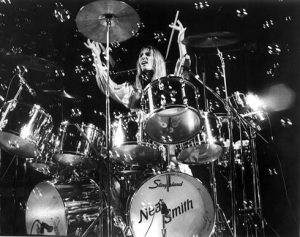 How emotional was it for you to record again with Alice on “Welcome 2 My Nightmare” album in 2011?
How emotional was it for you to record again with Alice on “Welcome 2 My Nightmare” album in 2011?
Both “Welcome 2 My Nightmare” and “Paranormal” (2017), it was just like no time passed. We have two new songs on Alice’s new album that will be coming up later this year, in 2020, I don’t know the name of it or the release date of it. It’s the follow-up to the “Breadcrumbs” album (2019 EP) with a Detroit-based theme, but every time we get together, we are a family. We lived in the same room for 7 years, it’s the same jokes, the same sense of humour, the same crazy ideas that never stop, the same inspiration, the same chemistry that we always had. It’s very-very natural -it’s the best way I can put it- when Michael, Dennis, Alice and I, get together and play in the studio and write our music. I don’t know if we can write the same songs that we wrote 40 years ago, but the fans seem to like the songs that we do on his albums. I still want to write a complete album. It’s out there, I don’t know if that will ever happen myself, but it would be great if we did. It’s always a gift when we can get together and write and record new songs this much time and the band’s heyday in the ‘70s.
How important was Bob Ezrin (Alice Cooper, Pink Floyd, Kiss producer) to the career of Alice Cooper Group?
Bob Ezrin, like I said a few minutes ago, he’s like my brother, and he is like that way to everybody in the band. Bob became the sixth member of the Alice Cooper Group and he was even younger than us. We were young at the time, in our early 20’s, but he was even younger than we were, like a year or two. He was starting from the ground up, we were starting from the ground up, Shep Gordon and Joe Greenberg with Alive Enterprises were starting from the ground up. We had nothing to lose, we were very creative, very influential. What Bob did… I’ll give you a perfect example: The song “I’m Eighteen” with the live stage on, it was 8 minutes long. When he first heard us at Max’s Kansas City in September 1970, he loved the song, and what he did after we got together to do pre-production for “Love It to Death” album and recorded in the studio: He took an 8-minute song and he cut it down to 3 minutes and made a 3-minute hit. Bob is a genius at arranging songs and to this day, he still is. He did two things: He ‘s a great arranger and he also added an element of classical music to our arrangements. Musically and eventually, we would add orchestration as time progressed over all of our songs. We would add orchestra, horns and strings to our songs and there was a musical progression over time. He was very influential in all of that and in the “Welcome 2 My Nightmare” album that Bob produced, the “Paranormal” album that Bob produced and we were in the studio for the new album in the end of 2019 and early 2020. Bob Ezrin was there also. So, we work very closely together and really when we have a chance to record, it’s going always to be with Bob.
What does the 2011 Rock and Roll Hall of Fame induction mean to you?
It was a great honour, but I was very sad because of Glen Buxton, our lead guitar player who had passed away in 1997, unfortunately. I was with him for two weeks, a week before he passed away, just before he passed away. So, that’s the sad thing about the Hall of Fame. I was sad that we didn’t make it in there when Glen was still alive, but I was very happy for the fans around the world who had stuck with us and been loyal to us, all the time, from the ‘70s all the way up to 2011, over 40 years. So, we were very happy, but I was the most happy for the fans. As far as I am concerned, the award that is in my home from the Rock and Roll Hall of Fame, belongs to the fans of the world, the original Alice Cooper Group fans, of course. Without them, we would have never been on that stage to be inducted in the Rock and Roll Hall of Fame. I’m still humbled and so grateful to this day, that what we did, they understood, they enjoyed it, they were entertained by it, it meant a lot to their lives as people, kids at school, some of the military in Vietnam, the stories that I’ve heard over the years. So, we influenced a lot of people in a lot of places around the world and I think when I look at it, in that perspective, the Rock and Roll Hall of Fame was a great thing for us and it’s almost funny now: We were accepted in the world of music instead of being like the bad boys of rock ‘n’ roll. But I’ll take it for what it is and I’m very proud of what Glen Buxton, Dennis Dunaway, Michael Bruce, Vincent Furnier aka Alice Cooper and myself, Neal Smith, did. I ‘m very proud of all of us for what we did, what we accomplished with the help of Bob Ezrin, Shep Gordon and Joe Greenberg. So, I’m very humbled by our induction in the Rock and Roll Hall of Fame in 2011.
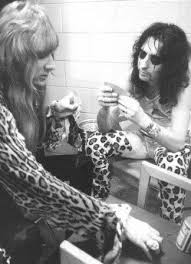 Do you wonder what would have happened if the band stayed together after 1974?
Do you wonder what would have happened if the band stayed together after 1974?
I don’t have a crystal ball, unfortunately, so I don’t know what would have happened, but I think we would have continued writing some great music. We just had to take the time off, that we did. We all recorded an album in the year we took off. Unfortunately, Alice found success with “Welcome to My Nightmare” (1975) and we didn’t come back and reform with the band. It was a challenging time because disco was so big in the ‘70s and I think that was one of the biggest challenges in rock music. The Stones figured out a way to get a hit song with “Miss You” (1978), during the ‘70s disco era. We had a song on “Muscle of Love” (1973) called “Big Apple Dreamin’ (Hippo)” and that was our closest attempt to anything with a danceable beat. I think we would have done well. The one thing that I feel bad about is that after the band broke up, there were probably a lot of great original Alice Cooper Group songs that they were never written and never recorded. That’s the downside to the band not being together. But I ‘m happy for everybody. Everybody stayed healthy. Alice had some bad years but he got healthy and he has been great since mid ‘80s and the good thing is, everybody is very supportive of each other in the original band. We all suffer still to this day a lot for Glenn Buxton, who was the heart and soul of the Alice Cooper Group.
Do you think the fact that you have been influenced by a wide variety of drummers such as Gene Krupa, Alex Duthart and Keith Moon, made your playing so unique?
Again, that’s a great comment/question. I love those drummers. I’m a drummer and I’m a fan of great drummers, great bands and great music. I mentioned Charlie Watts’ influence on the beginning of the song “Billion Dollar Babies”. Gene Krupa, one of the most fabulous drummers of all time; he actually made drums a solo instrument. The first white man to do, although there were many African-American, black drummers who were playing solo music way before Gene Krupa, but he was the first one to cross over and become an amazing drummer soloing. Yeah, my influences were Gene Krupa, Sandy Nelson, I even like Dennis Wilson with The Beach Boys, Ringo Starr, Charlie Watts, Mitch Mitchell with Jimi Hendrix, Ginger Baker with Cream and Keith Moon, of course. Keith Moon was one of the craziest, greatest drummers ever on this planet. When I first joined the band, all those inspired me. When I would come to a part of a song, I would wonder what Ginger Baker would play in this transition or what Keith Moon would play or Mitch Mitchell would play. Even up the “Killer”(1971) album, I’ve been still influenced by those drummers. By “School’s Out”, I pretty much found my niche and everything I played was just from Neal Smith. So, they were very influential, not only on my playing, but also on what Alice Cooper originally did musically on record and even live on stage.
What is the secret of the amazing chemistry that you have as a drummer with Dennis Dunaway?
I think that Dennis and I, we are one the greatest rock rhythm sections ever, in rock ‘n’ roll history. It started before I actually was in the band, in Arizona. I’m in Arizona today, I ‘m still stuck in Arizona because of the coronavirus. I will be out of here next week and I’m going back to my home in Connecticut. I’ve been here for seven months, but we lived here many years ago, we were back and forth in 1967. I was in Phoenix, I didn’t have a band at the time and The Nazz was over in Los Angeles and when they came back one time, Glen Buxton, Michael Bruce, Dennis Dunaway and myself went out in the desert and did some jamming, late at night. We took a couple of cold beers out there in the summer and cooled down in the evening, and plugged in an amp out in the desert in one of the pavilions they had for the public. Nobody around and we just started the jamming and from that time on, Dennis and I just locked as a rhythm section over time going into “Pretties for You”, “Easy Action” and “Love It to Death”. “Black Juju” was done live in the studio: Alice’s vocals, everything. It’s the only live song that we ever did in the studio in all of our albums. All the instruments, all the guitars and everything. By that time, we were pretty much locked until this day. I am talking about the chemistry we ‘ve got together for the “Welcome 2 My Nightmare”, “Paranormal” and then Alice’s upcoming album. Dennis and I, we just locked and it’s been that way forever. All we do is talk about the changes and the transition, but as far as the groove, it’s one of the tightest grooves in rock ‘n’ rock. There is no bass player in comparison to him, as far as the way we play, we lock into the tempo and the feel of the groove of the song and I really appreciate that. I know some fans have mentioned that over the years, I always admire them for noticing that and how unique it is and how great it sounds.
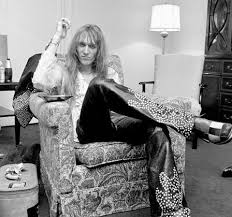 Do you have any memories from the Nazz concert with Pink Floyd at the Cheetah Club in Santa Monica in 1967?
Do you have any memories from the Nazz concert with Pink Floyd at the Cheetah Club in Santa Monica in 1967?
That was at the Cheetah Club in Santa Monica with Pink Floyd. That was still one of the most amazing first concerts I ever saw of a band. That was an interesting night. Syd Barrett was in the band at the time. They were characters and their music was amazing. Their light show was very low budget but they were very similar to us, in that matter: They were very creative with little money. The show to this day was memorable, their sound was memorable and actually we got to party with them for some time after the show and hang out with them for a few days. We got to know them better. Actually, Les Braden, one of their roadies, jumped ship with them and he joined us. He joined our crew. We had quite an affiliation and there are a lot of similarities in their career and in our career, but there are a lot of differences too, naturally. A lot of people think that they influenced our band. I know what their influences are. I think bands or musicians that influenced Pink Floyd also influenced us, like Stockhausen, early electronic music. We were very much into Stockhausen, early on. So, I think some of the influences for both bands were very similar, but I still love Pink Floyd to this day and it’s great that their music has far longevity. Bob Ezrin producing “The Wall” (1979) was another connection between Alice Cooper and Pink Floyd.
What were your impressions of Syd Barrett when Pink Floyd stayed in your house?
Syd Barrett was on another planet. When they came over to the house, he was really on another planet. He went over to corner of the room, put his nose in the corner and stayed there for hours and hours and hours. Nobody ever really talked to Syd Barrett. We were busy with the other guys in the band back then, but he was really a nonentity. Unfortunately, he was a casualty of all the demons of rock ‘n’ roll and I think he overdid it at an early age. Great-great talent. “The Piper at the Gates of Dawn” (1967) is a phenomenal album, still on my top-10 favourite albums in rock ‘n’ roll. I would like to say: “I got the chance to talk to him”, but nobody ever really talked to him, unfortunately. He was always just so out of it, but an amazing talent and it didn’t surprise me that eventually he had to be replaced in the band.
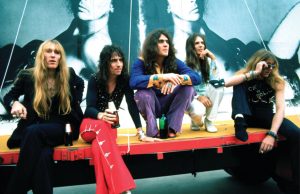 Do you miss Glen Buxton (Alice Cooper lead guitarist -died in 1997)?
Do you miss Glen Buxton (Alice Cooper lead guitarist -died in 1997)?
Yes, Glen Buxton was great on “School’s Out” album’s success. Glen and I were like brothers in the band. We were both from Akron, Ohio in the Midwest. His family moved to Phoenix, Arizona a few years before my family moved here, so we got to be friends after we lived here. He and I, met in college. We knew each other, we knew who we were, but we never had formally met before. From the time we met, we became best friends and then eventually it was Glen who was very influential on getting me in the band, once John Speer, The Nazz drummer had quit. So, Glen was truly one of a kind. As I mentioned before, he was the heart and soul of the group Alice Cooper. I did it on the “Billion Dollar Babies” album with the song “Billion Dollar Babies” ‘ intro. Glen did it on the “School’s Out” album with his guitar intro on the song “School’s Out”. You can’t hear that intro without knowing what song is that a part of. “I’m Eighteen” was a big hit, went to the charts. “Under My Wheels” was the hit single from “Killer”. It’s a great song, still a great live song. We did it in the UK a few years ago when we did a reunion in 2017, that was part of our set. But we needed a big hit and Glen’s intro and music on the “School’s Out” album and the single “School’s Out”, I think it was part of the reason that that song is just so incredible until this day. It’s all over the place. It’s played all over the world this time of the year. Unfortunately, with the coronavirus many schools around the world have been out for months, but hopefully some day the things will go back to normal. I’m sure the song it is still played worldwide. That’s all Glen’s influence. Unfortunately, in the early ‘80s he had some problems, but by the ‘90s he turned his life around. I had seen him occasionally. Like I said, I was lucky enough to be with him in Houston, Texas for two weeks before he passed away in the fall of 1997. It was phenomenal, we got together and then we played together on stage and he will always be missed, but he will never be out of our hearts and minds.
There is a nice Keith Moon story from a concert in Detroit. Would you like to share it with us?
I think we played at the Grande Ballroom, if I’m not mistaken. We were opening for The Who, back in the early ‘70s. It was an old theatre and they had a big movie projector that they would pull out. The opening band would set up their instruments and had obviously a lot less stage to play on. The interesting thing about those old screens is that from the front, they show the movie on it, you can’t see behind it. But when you stand behind it, with the lights on, you can see right through the screen. As we were playing “Black Juju” ending our set that night, I got off the show. We did “Black Juju”, we did our encore and I got off and Goose, who was my roadie at the time, he came backstage, he was near to Keith Moon: “Did you hear Keith playing?” I said: “What are you talking about?” He said: “While you were playing “Black Juju”, all the drums, the whole song “Black Juju”, Keith was on his drum set right behind you, behind the screen”, the screen that nobody could see him, except if you are backstage and Keith was playing live along with me the whole song. I said: “You gotta be kidding me!” That’s amazing. I wish somebody would have got a film of that. I would love to see it on film that. That’s what happened. When we were playing on stage -he wasn’t miked obviously, he was just playing his drums back there- I couldn’t even hear him, because of our roar on stage. I also heard that we were one of the loudest bands back in those days. We loved to play very loud, so there was no way to hear Keith back there. That was pretty impressive, I am impressed by that still to this day. I would have loved to be able to have somebody film that while it was happening. That would be a great visual, right on the stage, with me in front of the screen and Keith behind it playing along with me. (Ed: Here’s his answer about the rumour that he called Keith to make sure that he had one more drum than he did). That story is not true. That’s all I have to say about that story. Keith Moon and I, never talked about drums. It’s a nice story, but it’s not true.
How were you let in at the Coliseum in Phoenix, Arizona when Soft Machine opened for Jimi Hendrix?
I believe that was in 1968. Actually, it was Les Braden, who jumped ship with Pink Floyd, he was one of our roadies at the time. He knew all the roadies for all the English bands. We didn’t have any money then. We were pretty much poor. All we could do is pay for our rent and buy some food and beer, more importantly. We got in, we went backstage at the Coliseum, here in Arizona, and Jimi was playing and Soft Machine was opening for him. When we went in the back door, we said that we were Soft Machine, that’s how we got in. Even in our street clothes, we were more rock ‘n’ roll than most bands in those days were, once they were on stage. So, we got in and watched the show. Also, by that time, we had been partying with Jimi Hendrix. We actually saw him at four different times when he was playing: Three times in Arizona, and I think that was the last time we saw him in Arizona. Soft Machine, interesting band, they never made it, unfortunately, but Jimi Hendrix was very cool. They were friends early on in their career and Soft Machine and Jimi Hendrix said if one of those bands would make it, on their first world tour, they would have the other band open for them. Jimi Hendrix kept his word and on his first big world tour, had the Soft Machine open for him. They were an interesting band, they were like Pink Floyd but a little bit different. Of course, Jimi Hendrix was amazing on stage, but that was one of the few times that we actually snuck in somewhere to see a concert.
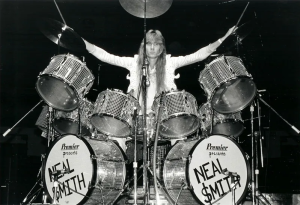 Your iconic mirrored drum set was the most spectacular in the history of rock ‘n’ roll! What was the concept behind this?
Your iconic mirrored drum set was the most spectacular in the history of rock ‘n’ roll! What was the concept behind this?
I sold the drum set in a big auction in Dallas, Texas at Heritage Auctions House in 2015. It was just time for someone else to take care of it. The concept behind that beautiful drum set was originally for the Billion Dollar Babies Tour. I just got the Premier drums out of England to sponsor me. I went from Slingerland to Premier, because many of the drummers that I liked in the UK in a lot of the bands, player Premier drums. Of course, Keith Moon played a Premier drum set and Ginger Baker. They sent me a brand new set of drums. It was a white pearl set and that wasn’t flashy enough for me to play on stage. I was going to get a white wood finish drum set with 22 drums, have them shipped over to the United States and I was going to get Budweiser to sponsor me. I was going to make handy drums to play Budweiser cans in 1973. I called the Budweiser company to have them sponsor me. I asked for two simple things: In each show I wanted a case of Budweiser and a case of Michelob backstage -which were there anyway- but I wanted that just for me (laughs). They were very angry at me. They said that no way in the world -actually, no way in hell- they would ever sponsor any rock group and especially the outrageous and sick Alice Cooper Group and they slammed the phone down on me. So, that idea didn’t work out.
Dennis Dunaway was always in the mirrors and when he saw these tiny mirrors in one cloth in his room in a house in Connecticut that he had a mansion and I thought they were pretty cool. He suggested: “Hey Neal, just take these mirrors and form them round and round the drum”. We just had to glue them on the drum. Eventually, that’s what we did. I had the drums and the roadies got to cut these mirrors in sheets, they were like 12×12 inches and then they just glued them all around the drums. Then, the set became just like a mirror ball, which for the Billion Dollar Babies show was phenomenal, because we had these gigantic mirror balls hanging from the top of the towers, right and left of the stage. When they were formed around the drums and the Super Trouper spotlight was set, it was like a million laser beams coming from the drums. It was phenomenal, but it was Dennis’ idea to do it and it came out great. It was one of the greatest ideas. After we had done that, that was the set that I played up through the end of the band. I took the set down to South America, played down there for the live shows we did in September 1974 and had the set until 2015 when I sold it with a lot of stage clothes. I was just running out of room. I still have over 100 drums and big, gigantic drum sets from “Love It to Death”, “Killer” and “School’s Out”, but that one I got rid of. That was one of the flashiest drum sets you would ever see on stage. Kiss tried to copy it but they used too small mirror, which didn’t work quite as well.
How exciting is it to be a real estate agent?
(Laughs) Well, I really retired from that five years ago, in 2015. I retired from the real estate business. They held my license until recently, but from 1985 to 2015, almost 30 years, I was a real estate agent selling residential real estate in Fairfield County, Connecticut. I just wanted to get into a whole different world, other than music and get away from the music business for a while. So, that’s why I decided to get into the real estate. And that’s something that I always had an interest in. When “School’s Out” became a success, we had extra money and Micheal made some investments in real estate, I made some investments in real estate, Alice made some investments in real estate. The band as a group, we made group investments in real estate in different parts of the country and in those days they were called “tax shelters”; sometimes they would be beneficial, sometimes they wouldn’t. I got my feet wet in investing in real estate, back in the ‘70s, so by the mid ‘80s, I got through a terrible divorce in 1980 and it took four years to go to that divorce. I was ready for a new career and get out of the music business.
I pretty much needed a big change and a friend of mine who I’m staying at the time, her brother had a real estate company. So, I got my license because I just wanted some more information to be educated about real estate and by getting my license there was a desk available for me if I cared to join the company in the greater Fairfield County, Connecticut. I sat down and then I got offers from customers. They went to buy a house. We furbished it, flipped it, sold it and I was on my way to a successful career in real estate business and like anything else, with upturns and downturns. That business very much follows the economy around the New York area. So, it was an education for me and I learned a lot from it. To this day, a lot of people ask me questions and advice and I’m still happy to give when I can. So, it was a good experience for me, a great thing to look back on and a great thing to always have in my hip pocket. By the time we were inducted to the Rock and Roll Hall of Fame, I sold some real estate after that and slowly I wanted to get more time and get out of Connecticut, for the winters. In 2015, I bought a second home here in Arizona where I come for the winters now. Again, all that was helpful for my educational experiences in the real estate business.
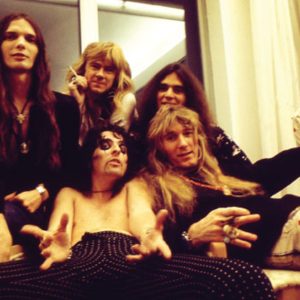 You are a huge Brian Jones fan. What is so special about him?
You are a huge Brian Jones fan. What is so special about him?
Brian Jones was all image to me. The first person that I ever copied and I was inspired and influenced by the image, was Dennis Wilson from The Beach Boys. When I moved to Arizona, surf was very-very big. The surf movement, face, craze, whatever you want to call it, was very big in the early ‘60s and The Beach Boys of course from California, just a few hours drive from Arizona. People would go from here over to California to surf. So, Dennis Wilson was a big-big influence for me. He had a big band of hairdo come over his eyes and I copied that style when I was in high school here. Of course, when I was in high school in 1963, The Beatles and the British Invasion started; the British Invasion of music, which was phenomenal and that was my second influence and inspiration. I liked The Beatles, I liked their music, I liked their haircuts. It was a great shot in the arm for rock ‘n’ roll music, rock needed something fresh. Music from the ‘50s and the early ‘60s needed a shot in the arm and the British Invasion music starkly did that. Everybody would love The Beatles and I liked the Beatles, I had the first couple of albums. Then, the Stones came and they were like the bad boys of rock ‘n’ roll. I said: “OK, I really like these guys” and Brian Jones was sassier, his hair was blond and longer than any of The Beatles. I thought he was a badass. Then, I got to see him live on stage on their first tour, again here at the Phoenix Coliseum in Arizona, back in 1964, I believe. He was great on stage, he just looked cocky: He was dressed all in green and he had pink bedroom slippers on and his hair was super on the blond haircut. The bangs were cut down to his eyes and he could barely see. He got a Vox teardrop guitar and I thought he was so cool. The Stones were so badass, too. From that time period in rock ‘n’ roll history, there was nobody cooler than the Stones. And the coolest person from the Stones was Brian Jones.
I said to my friends: “You know, I can have my hair as blond as that”. My hair was naturally blond when I was pretty young. I said: “I can have my hair longer than that. I can dress more outrageous than him. I can have the biggest set of drums in the world”. That was my influence. If in music you have to be a master of your instrument -which I took private lessons, I took lessons at school, I took lessons on drums that are in orchestra and marching band, I had a high school rock band, I was in The Laser Beats at Camelback High School- you also have to have an image. You have to write songs, you have to master your image to be able to look great on stage. Brian Jones had it all. He was my inspiration for just the image of a rock star. He wasn’t a drummer, he was a guitar player, but I also play guitar. I always have a guitar with me. I still have a pretty good collection of guitars right now. I found Glen’s Custom SG a few years ago and had it totally restored. It’s going to make an appearance on some albums in the near future. I always had a guitar, I appreciated guitar’s standpoint. I know how good these guys are. Brian Jones was one of a kind. He was obviously one of the rock superstars from the ‘60s and the early ‘70s along with so many like Jimi Hendrix, Janis Joplin and Jim Morrison. That was a tragedy when he passed away, but Brian was the key to inspiring me with clothes and image as a rock star in the early ‘70s. And the glam in the band. What we did was totally Alice Cooper, but it was always inspired by just doing something totally different like Brian Jones did.
A huge “THANK YOU” to Mr. Neal Smith for his time. I should also thank Billy James for his valuable help.
Neal Smith official website: http://nealsmithrocks.com
Buy “POP 85/95” album here: http://nealsmithrocks.com/store
Neal Smith official Facebook profile: https://www.facebook.com/NealSmithRocks

